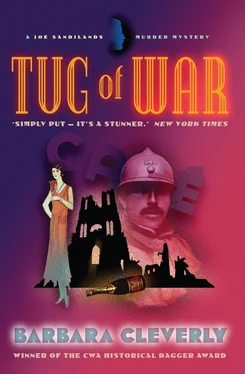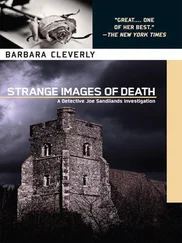Barbara Cleverly - Tug of War
Здесь есть возможность читать онлайн «Barbara Cleverly - Tug of War» весь текст электронной книги совершенно бесплатно (целиком полную версию без сокращений). В некоторых случаях можно слушать аудио, скачать через торрент в формате fb2 и присутствует краткое содержание. Год выпуска: 2011, Издательство: Constable & Robinson, Жанр: Исторический детектив, на английском языке. Описание произведения, (предисловие) а так же отзывы посетителей доступны на портале библиотеки ЛибКат.
- Название:Tug of War
- Автор:
- Издательство:Constable & Robinson
- Жанр:
- Год:2011
- ISBN:нет данных
- Рейтинг книги:3 / 5. Голосов: 1
-
Избранное:Добавить в избранное
- Отзывы:
-
Ваша оценка:
- 60
- 1
- 2
- 3
- 4
- 5
Tug of War: краткое содержание, описание и аннотация
Предлагаем к чтению аннотацию, описание, краткое содержание или предисловие (зависит от того, что написал сам автор книги «Tug of War»). Если вы не нашли необходимую информацию о книге — напишите в комментариях, мы постараемся отыскать её.
Tug of War — читать онлайн бесплатно полную книгу (весь текст) целиком
Ниже представлен текст книги, разбитый по страницам. Система сохранения места последней прочитанной страницы, позволяет с удобством читать онлайн бесплатно книгу «Tug of War», без необходимости каждый раз заново искать на чём Вы остановились. Поставьте закладку, и сможете в любой момент перейти на страницу, на которой закончили чтение.
Интервал:
Закладка:
Joe nodded, understanding. ‘Tell me, mademoiselle, how well did Dominique speak English?’
She looked at him blankly for a moment. ‘I really have no idea. I never heard him speak English. There was never a reason why he should. Why do you ask?’
‘Someone propounded a theory that, with his Anglo-Saxon looks, the patient in Reims could be an Englishman scooped up by the Germans, processed, misidentified — or not identified at all — and sent off to a camp in Germany for years. That is why I am here. Passing through Reims on my way south, I was asked to spend a moment or two looking into it. It’s thought important to check all the possibilities no matter how remote.’
‘He’s French. More particularly, he’s a Parisian.’ The tone was firm, the response that of a businessman clinching a deal. She expected no argument.
Joe handed back the photograph and she put it back in its place, immediately taking another one from the line. ‘And this one is just a snapshot taken by a friend but it shows us together.’
A youthful, round-faced Mireille, long glossy hair bouncing on to her shoulders, stood, hat on head, gloves on hands, awkwardly accepting the embrace of recognizably the same man though he was not in uniform but wearing a smart suit and hat and shining boots. Posed as they were in front of the fountain in the centre of the town, they could have been any courting couple walking out on a Sunday afternoon before the war.
Before he could speak she held up a hand and smiled. ‘Yes, I know this is scarcely proof in the eyes of the unimpressionable Inspector Bonnefoye who gave me quite a speech on the frequency and positioning of war wounds on returned soldiers.’ The smile widened to a grin. ‘A speech illustrated by charts of the human body, would you believe? And a hideously dramatic demonstration of sabre-slashing! But I understand that there are other claimants who can produce equally convincing evidence that the unknown soldier belongs to them — and by ties of blood which is something I could never claim. Though there is one indication which I had been hoping it would not be necessary to reveal. . I would not wish to demean this poor person unnecessarily in any way. He suffers indignities enough in that dreadful place.’ She raised her head and finished defiantly, ‘But if I must fight for him, then I will use any weapon that comes to hand. I wonder, Commander, if you could ask your niece, Miss Dorcas, to go in search of the tray of refreshments I had ordered? Marie should be stumbling along the corridor as we speak. Perhaps you could go to her assistance, mademoiselle?’
Dorcas took her dismissal without demur though her eyes narrowed and she favoured Mireille with a long and meaningful stare.
Left alone, Mireille faced him, almost laughing. ‘Goodness! She could give lessons in suspicious staring to my cat! I almost expected to feel her claws! She is very protective of you, I think? I’m sorry. I sent her off awkwardly but I am not aware of how much a woman of the world she is, your charming niece, Commander. I would not like to cause embarrassment in one so young by what I have to say, though. .’ She paused for a moment and added thoughtfully, ‘I suppose I was not a great deal older than she is when I made the discovery for myself.’
Chapter Nine
Didier Marmont, mayor of Choisy-sur-Meuse in the Ardennes forest, stood on the steps of the town hall heroically fighting back an urge to run a finger around his starched collar. His nervousness restricted itself to a swift twitch at the tricolore sash fastened around his comfortable stomach. Above or below? The bulge was making the positioning of his symbol of authority increasingly tricky. He glanced with a moment’s envy at the still-lean shape of the uniformed American officer sharing the steps with him. The man hadn’t put on an ounce since he’d stormed through the town as a lieutenant nearly ten years ago.
With the last note of the Marseillaise, following on the American national anthem rousingly played by the town band, their moment had come. Didier, the host, was the first to speak. He swept a commanding gaze over the upturned eager faces crowding the square and, as always, though he never counted on it, confidence began to flow. His voice boomed out, the grandiose phrases everyone waited to hear unfurled and he dashed a manly tear from his eye. Especially warm this year were his compliments to their US Army guests, the faithful band who returned year after year to the town that had welcomed them and billeted them. The last resting place of many of their comrades, the town was remembered with nostalgic affection but also with practical help. The Doughboys had come mainly from the same small place in the States and, on repatriation, had set about collecting funds to send back to their adopted village in France.
The results of eight years’ hard work were all around them as they stood in the hot August sunshine. The mairie itself, the school and the two bridges spanning the winding river Meuse owed their existence in large part to transatlantic generosity. And, in return, the French had built for the American dead the cemetery and monument they were on this day to hear the Colonel dedicate.
To the crowd’s claps and cheers, the Colonel, a career soldier, stepped forward to respond to the mayor’s introduction. Didier’s son-in-law. It hardly seemed possible. Then he looked at his daughter standing in the front row of the audience, proudly holding up her baby son to witness his father and his grandfather sharing a platform. Though how much a six-month-old could make out he wasn’t sure, and Didier rather thought little John ought to be tucked up at home in his cot, not sweating it out with the rest of them in this heat and noise. Didier had been overjoyed to see his first grandson though he had wondered about the wisdom of subjecting a small infant to a transatlantic crossing. America was so impossibly far away. He was always surprised that the people they loved continued to return.
His daughter was not the only local girl to be lured west by these handsome great fellows with their promise of excitement and an expanded life. The girls came back on their arm and you could pick them out in the crowd by their silk stockings, high-heeled shoes and pretty dresses. And, especially in his daughter’s case, Didier acknowledged, by her happy face. He was thankful to see it. Yes, Paulette was happy.
The Colonel spoke briefly in English and then launched into French to a rising cheer from the crowd. He knew the strings to tug at and the emotive words rang out with pride and certainty: l’entente cordiale, l’amitié éternelle, nos amis, nos épouses, nos confrères . . And he finished with a ringing reminder of the phrase which had been on all their lips ten years ago: Ils ne passeront pas! Ils ne passeront jamais plus!
The ceremony over, Didier made his excuses and slipped away. He hadn’t the energy to confront his daughter and her forceful husband again just yet. He agreed there were many advantages to joining his only living relations over the Atlantic but he shuddered at the idea of the long sea crossing and he felt faint at the thought of the effort he would have to make to start, in approaching old age, on a life in a new land. He fled to the Promenade down by the river. A walk under the chestnut trees would cool him and help him to consider his future. What remained of it.
As he strolled deep in thought a sound above his head distracted him. He looked up to see an aeroplane looping the loop, stalling and beginning to drop from the sky. A paper aeroplane. To the accompaniment of excited giggles from the branches of the chestnut, he threw off his dignity and dashed about like a music-hall mime artist, chasing and finally catching the plane in his upturned top hat.
Читать дальшеИнтервал:
Закладка:
Похожие книги на «Tug of War»
Представляем Вашему вниманию похожие книги на «Tug of War» списком для выбора. Мы отобрали схожую по названию и смыслу литературу в надежде предоставить читателям больше вариантов отыскать новые, интересные, ещё непрочитанные произведения.
Обсуждение, отзывы о книге «Tug of War» и просто собственные мнения читателей. Оставьте ваши комментарии, напишите, что Вы думаете о произведении, его смысле или главных героях. Укажите что конкретно понравилось, а что нет, и почему Вы так считаете.












